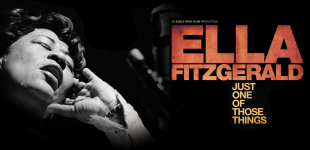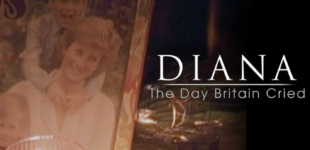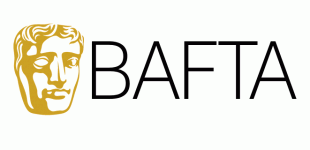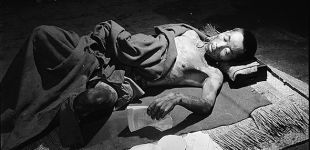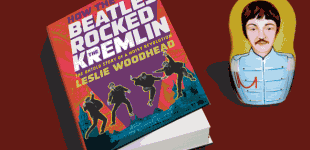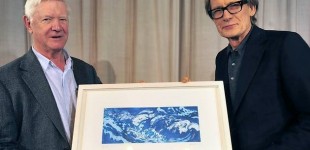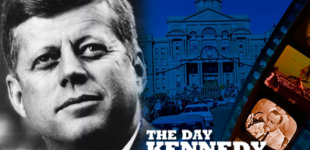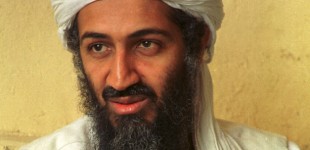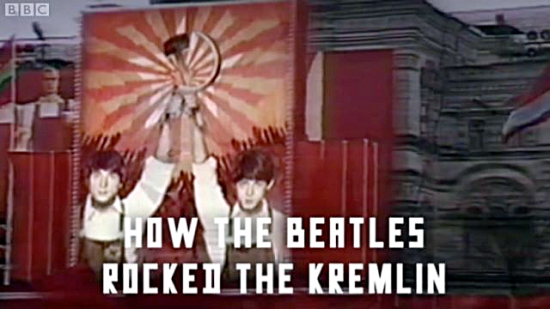How The Beatles Rocked The Kremlin (BBC Four/Thirteen)
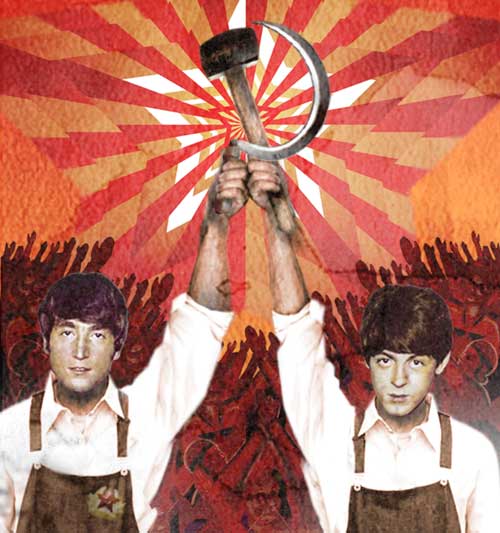 This film was a real labour of love for me since it brought together passions from my entire life as a film maker – from working on the first-ever film with the Beatles in 1962 to recording the obsessions of Beatles fans across the former Soviet Union over the past 30 years.
This film was a real labour of love for me since it brought together passions from my entire life as a film maker – from working on the first-ever film with the Beatles in 1962 to recording the obsessions of Beatles fans across the former Soviet Union over the past 30 years.
Overview
In August 1962, I made a little film with four unknown kids playing in a Liverpool cellar. I was a very raw recruit to TV, working on a local news programme in Manchester, and I’d been asked to find something to contrast with the Brighouse and Rastrick Brass Band. A friend told me to contact a man called Brian Epstein. I thought Epstein was surprisingly dapper for a rock manager, but he led me to a dingy basement in the city centre – “The Cavern Club” Epstein told me. The music roared up to meet me as we felt our way down the stairs – and I got my first sight of The Beatles.
This was not my music. I was – and still am – a modern jazz fan. But the visceral thrill of the not-yet Fab Four punched me in the stomach. I was hooked. In the pub afterwards, Paul McCartney said to me: “It must be dead glamorous working in TV”. On the way home, still high on the assault of that music, I had to stop my car and be sick in a ditch.
A few days later, we shot the first ever film with The Beatles, a sweaty lunchtime session in the Cavern. Today, that two-minute scrap of grainy black-and-white film looks like something excavated during World War I. But over almost 50 years since then, that footage has somehow shaped my life as a filmmaker.
In the mid 80s, when I started to make documentaries in the Soviet Union, I began to hear stories – incredible at first – about how the Beatles had changed the USSR. A few Russian fans told me had even seen that little film I made in the Cavern Club. I knew the Fab Four had never been able to play behind the Iron Curtain, denounced as capitalist pollution by the repressive old men in the Kremlin. I heard that fans had been arrested for smuggling Beatles music, and had been kicked out of University for having a Beatles album. The stories piled up as I came back to make documentaries in Russia over the last 20 years.
I heard fantastic tales of how Beatles-starved comrades inscribed bootleg tapes of I Feel Fine into X-ray plates of their Uncle Sergei’s lungs – the only vinyl available. I was told how phone boxes across the Soviet Union were vandalised to make pickups for home-made guitars carved from kitchen tables. And serious witnesses – professors, reporters, the Russian Deputy Premier – insisted that the music and spirit of The Beatles had played a more important role in washing away the foundations of totalitarianism than the decades of Cold War propaganda or the threat of nuclear missiles.
I have wanted to make this film for years, and the finished documentary, crammed with bizarre archive and improbable tribute bands, is even wilder and more surprising than I’d anticipated
How The Beatles Rocked The Kremlin has been fun to make. But along the way, it also tells the unknown story of a revolution which helped to change a superpower.
Watch the Trailer
Praise for “How The Beatles Rocked The Kremlin”
OK, I swear, I’ll stop ranting right after this about how that last Ken Burns “The National Parks” documentary didn’t need to run for 12 hours, but watching “How the Beatles Rocked the Kremlin” on PBS provides a great reminder of crisp, economical documentary storytelling., The one-hour special will air Nov. 9 and marks the 20th anniversary of the Berlin Wall coming down. Yet producer-director-narrator Leslie Woodhead makes a stirring case about how the Beatles — at least as much as all the spy-counterspy antics of the Cold War years — befuddled and undermined Kremlin leaders, speaking to a generation of Soviet youths who were wildly enamored with the Fab Four’s music., HowTheBeatlesRocked, Woodhead interviews a wide assortment of Russians who privately rocked to Beatles songs, interspersed with footage of the boring state-run entertainment that the kids there rejected. He also talks of the legend of an impromptu “secret concert” spurred by the group’s “Back in the U.S.S.R.,” and eventually illustrates the Beatles’ triumph over the Soviet leadership when we see a Russian Perry Como type singing a very stiff version of “Hey Jude.”, Russia’s deputy premier, Sergei Ivanov, can’t seem to suppress a big goofy grin as he talks about learning English in part by listening to smuggled Beatles records, and Woodhead speaks to Beatles cover bands that remain prevalent throughout the old Soviet bloc to this today. The spec culminates with Paul McCartney performing to what can only be described as rapturous fans., All told, it’s both an enlightening and inordinately fun look at how the Beatles’ influence might actually have been more significant within the Soviet Union than the west. And did this WNET-backed production really do all that in an hour?, Yeah yeah yeah.
Variety (November 05, 2009)
Most charming programme of the past week was Leslie Woodhead’s contribution to Beatles’ week (Storyville: How the Beatles Rocked the Kremlin, BBC4 Monday), on how the group undermined the Soviet Union. Here [Woodhead ] returns to a theme he broached in a tremendous 1992 piece (with Reggie Nadelson) on Dean Reed, the American rock singer adopted by the Soviet Union: the place and effect of rock in a closed ideological system. …The real glory of the film was the people and events it captured: Josif Kobzon, the USSR’s official songster, doing “Hey Jude”; Belorussian rocker Yuri Pelyushonok getting his old combo together to sing a special composition on the effect of the Beatles (“Hey, pal, don’t wake the people!”); and best of all, Kolya Vasin – “I’m sure God sent them to us” – a bearded Russian mystic out of Dostoyevsky by way of Liverpool, who created the Beatles museum over 40 devoted, demented years. This Storyville production showed what one can do with care, time and devotion: lead us to understand something of the universe so that we can be, not its masters, but a little more its citizens.
John Lloyd, Financial Times
Storyville – How the Beatles Rocked the Kremlin presents a refreshingly different perspective on their significance, by showing how their music may have contributed to the collapse of the USSR. It sounds like a ludicrously lofty claim, but renowned documentary filmmaker Leslie Woodhead, with the help of several ageing fans (including Putin’s deputy prime minister), argues persuasively that their music – banned in the USSR and bootlegged by teenagers – instilled dreams of hope and freedom of expression within an entire generation, which eventually led to the demise of communism. If we must have new documentaries about the Beatles, then they should be from interesting new angles such as this.
The Scotsman
